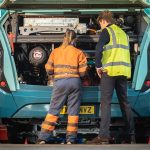With the continuing pressure to reduce emissions, the IRTE Conference takes a look at what those in the industry are doing to comply, the options out there to meet standards, and what’s next
The Institute of Road Transport Engineers’ (IRTE) sixth annual conference took place on Thursday (27 September).
Held at Leicester Marriott Hotel, around 100 professionals from across the road transport industry attended the event, with the opportunity to network and listen to speakers focusing on a range of topical issues affecting the different sectors.

The conference is run in partnership with the IRTE’s monthly magazine Transport Engineer.
Says the magazine’s Editor Will Dalrymple: “Over the past year, there has been lots of media attention and government pressure on commercial vehicle emissions, so I designed this year’s conference in response to that.
“There were technical presentations about gas engine developments, retrofitting buses to meet emission requirements and forming consortia to develop new kinds of low-carbon vehicles.”
Road to zero
At the heart of the government’s pressure on vehicle emissions is the introduction of Clean Air Zones (CAZs) and London’s Ultra Low Emission Zone.
Francis Robson, Technical Specialist – Intelligent Mobility at Cenex, provides an overview of what CAZs are, the reasons they are necessary and how vehicles are evolving to support them.
With CAZs now planned for many urban centres around the UK outside of London – including Southampton, Birmingham and Leeds – they will continue to challenge operators of LGVs, PSVs and municipal fleets, says Francis.
The future of CAZs is not static, he adds, with zero-emission zones likely to become more prevalent.
“External pressures, such as the Paris Agreement and the World Health Organisation will continue to have an effect on CAZs and will eventually lead to zero-emission zones in the not-too-distant future,” he says.
Plans are already in place for the roll-out of zero-emission vehicles, such as the UK’s pledge to ban petrol- and diesel-only vehicle sales in the UK from 2040 and the ‘grand ambition’ in 2050 for all UK sales to be zero-emission.
“Those two pledges play a key part in the road to zero strategy,” says Francis.
One operator all too familiar with the importance and requirements of moving towards a zero-emission fleet is Go-Ahead London.

A collaboration between the bus operator, Alexander Dennis Limited (ADL) and BYD led to one of the first fleets of full-electric buses outside of China.
A session comprising Richard Harrington, Go-Ahead London Engineering Director; Arthur Whiteside, ADL Managing Director UK Sales; and Frank Thorpe, BYD’s Country Manager gave the points of view from all three businesses involved in the partnership, reflecting on the engineering issues encountered during the design and implementation stages, and how they were solved.
Richard provides an honest and frank account of the operator’s journey to an all-electric fleet at its Waterloo garage.
A learning curve
Challenges faced included language barriers with Shenzhen-based BYD and the first prototype that was delivered in August 2013 was the wrong size and had various compliancy issues.
“We have a refurbishment centre in Dorset, so we had it down there for a couple of months,” says Richard. “It wasn’t a huge amount of work, but we had to get certain bits and pieces right and we got it into service in December 2013.”
The fact that there was no other similar model to replicate was another issue, says Richard.
“We had to put a bid in for an electric bus route, but there is no guidebook on how to do this. When you’ve got to transform a whole depot with 50 buses, that really gives you a lot to think about,” he says.
One of these considerations was how to park the buses.
“When you’ve got charging posts, you can’t just park your buses like you used to. There’s a lot more reversing as the charging points are at the back. We told drivers to start parking the buses in a certain manner early on, so they could get used to it before the new buses arrived,” Richard adds.
Bus retrofits
Not everyone has the luxury of purchasing new vehicles to meet Euro 6 standards, so retrofitting older vehicles is an option.
Amminex Emissions Technology’s Product Manager, Lars Tinggaard Johannsen, explains how Amminex has been involved with retrofitting the Metroline bus fleet with an emissions aftertreatment system.

“Our approach is slightly different from the mainstream retrofit, in that we’re not using AdBlue. We’re using a different technology where we have gaseous ammonia being released directly into the system,” says Lars.
This is called Ammonia Storage and Delivery System (ASDS) and Metroline has seen two advantages. Firstly, ASDS is able to remove NOx from the diesel exhaust in typical city driving conditions, and, secondly, vehicle uptime has improved, avoiding expensive repairs and maintenance costs on AdBlue-based solutions.
A further case study of successful retrofitting is presented by Andy Brooks, Business Development Manager at Milbrook and its Principal Engineer Richard Hudson.
Andy and Richard explain the process of Millbrook’s first bus conversion in the Cummins RePower programme, swapping a new engine and aftertreatment system into an older bus.
A 2009-built ADL E400 Euro 5 double-deck received the latest Cummins B6.7 Euro 6 system, which also incorporated a new stop-start ZF transmission, new cooling pack and replacement electric ancillaries such as fans and power steering.
Says Andy: “If we look at some of the studies that have been done from Euro 5 to Euro 6, it’s created a 95% reduction in NOx, extending the life of these vehicles by possibly up to eight years.
“We believe up to an 8% fuel saving is achievable over the previous Euro 5 by deploying the stop-start technology and electrication. Another advantage is this powertrain is also compatible with biodiesel and renewable diesel.”
























